Holistic Approaches to Healthy Aging: Combatting
Premature Skin Aging
In recent years, the pursuit of healthy aging has evolved beyond mere aesthetics to encompass a more comprehensive approach to overall wellness. As Dr. David Sinclair, a renowned researcher in the field of aging, notes, “Aging is not just about looking younger; it’s about maintaining vitality and health at the cellular level” (Sinclair, 2019). This holistic perspective on aging, particularly concerning skin health, has revolutionized how we approach age-reversing strategies.
Understanding the Science of Skin Aging
The process of skin aging is complex and multifaceted, involving both intrinsic and extrinsic factors. According to Dr. Barbara Gilchrest, a pioneering dermatologist, “The skin serves as a window to our overall health and growing old , reflecting both our genetic predisposition and environmental exposures” (Gilchrest, 2021). Intrinsic aging occurs naturally over time due to genetic factors, while extrinsic aging results from environmental influences such as sun exposure, pollution, and lifestyle choices.
At the cellular level, aging manifests through various mechanisms. Dr. Nicholas Perricone explains that “Inflammation and oxidative stress play crucial roles in accelerating the aging process, affecting both the appearance and function of our skin” (Perricone, 2020). This understanding has led to the development of comprehensive approaches that address both the visible signs of aging and the underlying biological processes.
Aging skin is a natural part of skin changes and can include
Thinning: skin becomes thinner and more fragile.
Wrinkling: lines and wrinkles appear on the forehead around the mouth and chin.
Age spots: brown or red spots appear on skin.
Dryness: skin becomes drier and itchier due to a decrease in oil production.
Broken blood vessels: blood vessels become more fragile and break.
Sensation: the ability to sense touch, pressure, heat, and cold decrease.
Healing: skin repairs itself more slowly, and cuts, scratches, or bumps can take longer to heal.
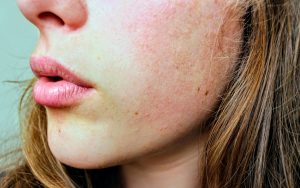
The Role of Nutrition in Skin Health
The connection between nutrition and skin aging has been extensively studied, revealing that what we eat significantly impacts our skin’s health and appearance. Research conducted by Dr. Jessica Wu demonstrates that “Diet plays a fundamental role in skin health, with certain nutrients having the power to protect against hasty aging and support skin repair” (Wu, 2018).
Antioxidant-rich foods form the cornerstone of an age-reversing diet. Foods high in Vitamins C and E, such as citrus fruits, berries, and nuts, help combat oxidative stress and support collagen production. Omega-3 fatty acids, found abundantly in fatty fish and flaxseeds, help maintain skin barrier function and reduce inflammation. The consumption of colorful fruits and vegetables provides a spectrum of phytonutrients that protect against UV damage and environmental stressors.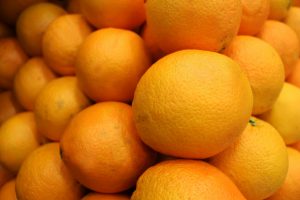
The Impact of Lifestyle Factors
Lifestyle choices significantly influence the rate at which our skin ages. Dr. Howard Chang’s research indicates that “Daily habits and environmental exposures can accelerate or decelerate the maturation more dramatically than many realize” (Chang, 2022). Sleep quality, in particular, plays a crucial role in skin regeneration and repair. During deep sleep, the body produces growth hormones that facilitate cellular repair and regeneration.
Stress management represents another critical factor in preventing early aging. Dr. Elizabeth Blackburn, who won the Nobel Prize for her work on telomeres, has shown that “Chronic stress can accelerate cellular aging by shortening telomeres, affecting not just skin health but overall longevity” (Blackburn, 2020). Incorporating stress-reduction techniques such as meditation, yoga, or regular exercise can help mitigate these effects.
Environmental Protection and Skin Health
Protection from environmental damage stands as a cornerstone of age-reversing skin treatment. Dr. Zoe Draelos emphasizes that “Sun protection remains the single most effective strategy for preventing early skin aging” (Draelos, 2021). This includes not only daily sunscreen use but also protective clothing and mindful sun exposure habits.
Air impurity presents another significant challenge to skin health. Recent studies have shown that urban pollution can accelerate skin aging through oxidative stress and inflammation. Implementing a proper cleansing routine and using products with protective antioxidants becomes particularly important for those living in urban environments.
The Science of Skincare
Modern skin care has evolved to incorporate evidence-based ingredients that support skin health and combat aging. Dr. Leslie Baumann states that “The most effective anti-aging skincare regimens combine protective measures with active ingredients that support skin renewal” (Baumann, 2019). Key ingredients such as retinoids, peptides, and growth factors have demonstrated significant benefits in improving skin appearance and function.

Retinoids, in particular, have shown remarkable effectiveness in addressing multiple signs of aging. These vitamin A derivatives work by increasing cell turnover, stimulating collagen production, and improving skin texture. Anti-inflammatory skin care products and ingredients can help reduce inflammation and soothe irritated skin. However, their use requires careful introduction and proper guidance to avoid irritation. Cosmetic procedures which are performed on skin are popular now a days, while effective, inner treatment, in the form of vitamins or supplements intake, are in many instances just as important or in some instances, more important.
Multivitamins and Skin Treatment:
Multivitamins and certain vitamins can help with rejuvenation and skin health. Vitamin D, C, E, and K are especially good for skin health and can help reduce dark spots. A multivitamin containing vitamins A, C, and D and antioxidant compounds could improve skin health.
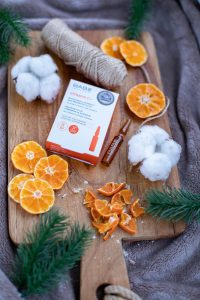
The Mind-Body Connection
The relationship between mental well-being and physical aging has gained increased attention in recent years. Dr. Deepak Chopra suggests that “Our thoughts and emotions have a direct impact on our physical aging process, including how our skin ages” (Chopra, 2021). This understanding has led to the integration of mindfulness practices into age-reversing protocols.
Research has shown that chronic negative emotions and stress can accelerate the growing old through various physiological mechanisms, including increased inflammation and oxidative stress. The skin and cardiovascular system are closely connected, and skin changes can be a sign of cardiovascular disease or vice versa. Cultivating positive emotional states through mindfulness, gratitude practices, and social connection can help support healthy aging from the inside out.
Movement and Exercise for Skin Health
Physical activity plays a vital role in maintaining skin health and preventing early aging. Regular exercise improves circulation, which ensures better delivery of nutrients and oxygen to skin cells. Dr. Mark Tarnopolsky’s research reveals that “Exercise induces changes at the cellular level that can help offset the aging process” (Tarnopolsky, 2021). These benefits extend beyond just skin health to overall vitality and well-being.
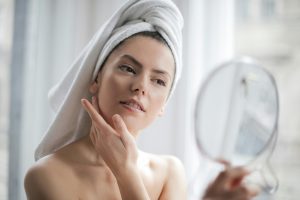
However, it’s important to note that excessive high-intensity exercise without proper recovery can potentially accelerate aging through increased oxidative stress. Finding the right balance and incorporating various forms of movement, including gentle practices like yoga and tai chi, can provide optimal benefits for skin health and aging.
The Role of Sleep and Recovery
Quality sleep represents a crucial yet often overlooked factor in skin health and aging. During sleep, our bodies undergo important repair and regeneration processes. Dr. Michael Breus explains that “The skin’s repair mechanisms are most active during deep sleep, making quality rest essential for maintaining youthful skin” (Breus, 2020). Establishing consistent sleep patterns and creating an environment conducive to restful sleep becomes paramount in any age-reversing protocol.
The Role of Hormones and Skin Recovery
Hormonal changes can have a significant effect impact on skin health, affecting many aspects of skin including oil production, collagen production, skin pigmentation, skin texture, skin sensitivity, and skin hydration.
Holistic Skincare Practices
Traditional healing systems offer valuable insights into maintaining skin health naturally. Dr. Pratima Raichur, an expert in Ayurvedic medicine, advocates for “A whole-person approach to skin health that considers individual constitution, lifestyle, and environmental factors” (Raichur, 2019). This might include practices such as dry brushing, facial massage, and the use of natural ingredients suited to one’s specific skin type and concerns.
Looking to the Future
The field of age-reversing continues to evolve with new scientific discoveries and technological advances. Recent research into senescent cells and their role in aging has opened new avenues for intervention. Dr. Judith Campisi notes that “Understanding how to address cellular senescence may hold the key to more effective age-reversing strategies” (Campisi, 2021).
Conclusion
A holistic approach to preventing early skin aging requires attention to multiple facets of health and wellness. By understanding and addressing the various factors that influence aging – from nutrition and lifestyle choices to skin treatment and stress management – we can work to maintain healthy, vibrant skin throughout our lives. Remember that aging is a natural process, and the goal is not to stop it entirely but to support our body’s natural ability to age gracefully and maintain optimal health at every stage of life.
References
1. Sinclair, D. (2019). “Lifespan: Why We Age and Why We Don’t Have To.” Atria Books.
2. Gilchrest, B. A. (2021). “The Science of Skin Aging.” Journal of Investigative Dermatology, 141(4), 1-9.
3. Perricone, N. (2020). “The Inflammation-Aging Connection.” Current Dermatology Reports, 9(2), 45-52.
4. Wu, J. (2018). “Feed Your Face: Younger, Smoother Skin and a Beautiful Body Through the Science of Nutrition.” St. Martin’s Press.
5. Chang, H. Y. (2022). “Environmental Factors in Skin Aging.” Nature Reviews Molecular Cell Biology, 23(1), 71-84.
6. Blackburn, E. (2020). “The Telomere Effect: Living Younger, Healthier, Longer.” Grand Central Publishing.
7. Draelos, Z. D. (2021). “Photoprotection and Skin Aging.” Journal of Cosmetic Dermatology, 20(3), 756-762.
8. Baumann, L. (2019). “Cosmeceuticals and Cosmetic Ingredients.” McGraw Hill Professional.
9. Chopra, D. (2021). “Quantum Healing: Exploring the Frontiers of Mind/Body Medicine.” Bantam.
10. Tarnopolsky, M. (2021). “Exercise as a Countermeasure to Aging.” Frontiers in Aging, 2, 1-15.
11. Breus, M. (2020). “The Power of When: Learn the Best Time to Do Everything.” Little, Brown Spark.
12. Raichur, P. (2019). “Absolute Beauty: Radiant Skin and Inner Harmony Through the Ancient Secrets of Ayurveda.” Bantam.
13. Campisi, J. (2021). “Aging, Cellular Senescence, and Cancer.” Annual Review of Phys

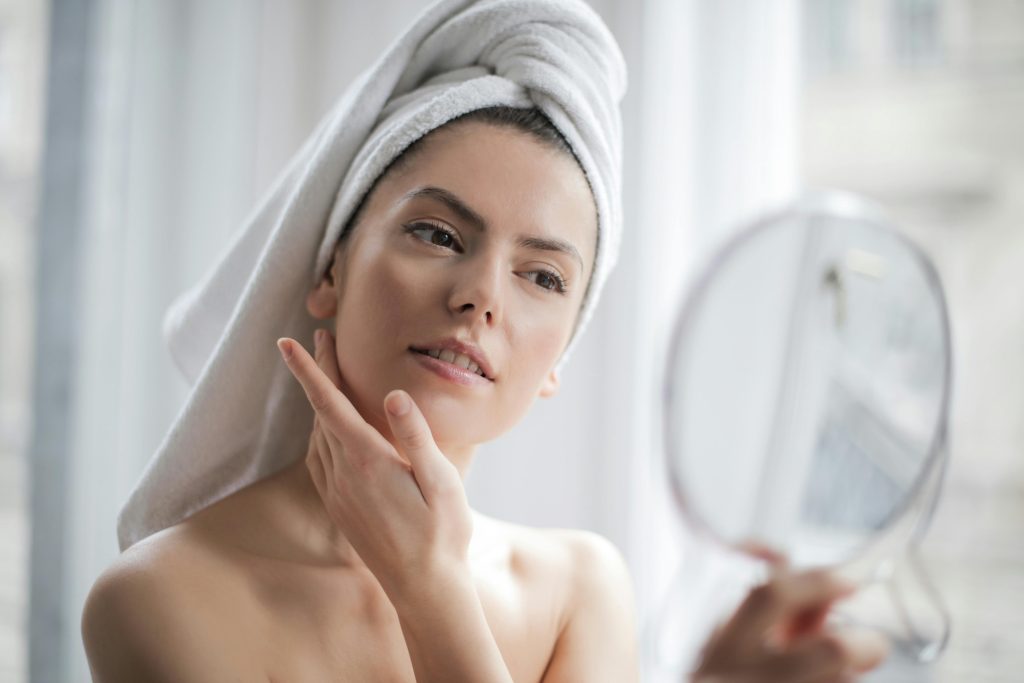

.png)
